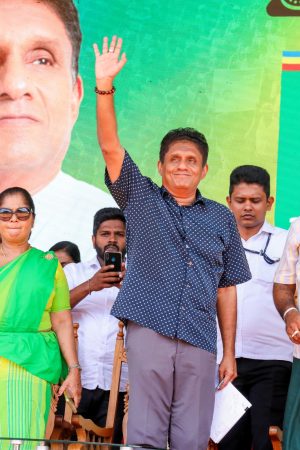India has always had a vested interest in Sri Lanka’s politics. This is evident yet again as the September 21 presidential election in the strategically located Indian Ocean island approaches.
One of the key reasons underlying India’s interest in Sri Lankan elections is the island’s proximity to India. India has a large Tamil population and so does Sri Lanka. These populations not only have linguistic and cultural similarities but also kinship bonds. Politics on either side of the Palk Straits have had an impact on developments on the other side.
Moreover, Sri Lanka lies near southern India, where several of India’s vital security and scientific installations, such as nuclear power plants, space research centers, and naval bases are located. India’s primary concern has been ensuring that no foreign power, especially one it views as antagonistic, gains undue influence over Sri Lanka.
For the last decade and a half, China has been the external force India is most wary of, prompting India to support Sri Lankan politicians who are either critical of or opposed to China’s growing influence.
It is well known in Colombo political circles that in the 2010 and 2015 presidential elections, India supported former Sri Lankan Army Chief Sarath Fonseka and Maithripala Sirisena of the Sri Lanka Freedom Party (SLFP), respectively. India chose to support the two because they were contesting against Mahinda Rajapaksa, who had worked closely with China for a decade. Therefore, it is safe to say that India will support the candidate who is least likely to support or is against China among the frontrunners in this election, as well.
Sri Lanka has four main contenders for the September 21 presidential election. They are Anura Kumara Dissanayake representing the National People’s Power (NPP), President Ranil Wickremesinghe contesting as an independent candidate, opposition leader Sajith Premadasa of the Samagi Jana Balawegaya (SJB), and Namal Rajapaksa of the Sri Lanka Podujana Peramuna (SLPP). Out of those, Dissanayake and Premadasa are the frontrunners and when election results are declared on September 22, one of the two men will likely be declared the ninth executive president of Sri Lanka.
In a previous article, I argued that Dissanayake would be China’s preferred candidate. Dissanayake’s NPP has its foundation in the center-left political tradition, with the Janatha Vimukthi Peramuna (JVP) — the main driving force within the NPP — tracing its origins to the pro-China faction of the Sri Lanka Communist Party in the 1960s. Despite a much-publicized visit to India earlier this year, the NPP has not changed its stance against India. Although the NPP is not an anti-India party, its growing popularity stems largely from its strong stance against the sale of national assets to foreign companies. The NPP has been vocal in opposing India’s Adani Group’s acquisition of control over key sectors such as Sri Lankan ports, renewable energy, and airports. The Narendra Modi government is tied at the hip with Adani.
A few days ago, Dissanayake threatened to cancel the controversial energy deal with Adani because the agreement is against the country’s national interest. Appearing on a television talk show, the NPP leader said that Sri Lanka has agreed to purchase each unit of renewable energy Adani produces at its wind farm in Mannar at twice the market rate. Dissanayake said that while he supports South Asian energy connectivity, he is against agreements that weaken the Sri Lankan economy and the competitiveness of its businesses. Dissanayake has also promised to keep poaching Indian fishermen away from Sri Lanka’s territorial waters.
On the other hand, Premadasa and his associates are more inclined toward India, and his SJB, being an offshoot of the right-wing United National Party (UNP), is much more suspicious about China. Even as early as the 1950s, the UNP was against the establishment of diplomatic relations with China and in the 1960s it had wanted Sri Lanka to declare China as the aggressor against India during the China-India border war. The current generation of the SJB leadership is also skeptical of China. The SJB has often criticized China for its debt trap diplomacy. Premadasa is the only main contender who has agreed to fully implement the 13th Amendment to the constitution, which has been a constant Indian demand on Sri Lanka.
Premadasa also has the support of the Illankai Thamil Arasu Kadchi (ITAK), a political party that has close ties with India. It is speculated that Ajit Doval, India’s national security adviser, who was in Sri Lanka a few weeks ago to sign a Memorandum of Understanding (MoU) with member states of the Colombo Security Conclave (CSC) and the Charter for the Establishment of the CSC Secretariat, had influenced Tamil parties to support Premadasa.
With the loss of an ally in Bangladesh, India finds itself with fewer friends in South Asia. In response, India has been working to repair and strengthen ties with both the Maldives and Sri Lanka in recent years. Ensuring a friendly administration in Sri Lanka is crucial for India, as it seeks to maintain the strong relationship Prime Minister Modi currently enjoys with the country’s right-wing, China-skeptic government.
India’s involvement in the upcoming presidential election is driven by its desire to counter Chinese influence in Sri Lanka. With Premadasa representing a pro-India stance and Dissanayake leaning more toward China, the election’s outcome can significantly shape Sri Lanka’s foreign policy direction. While India’s support for Premadasa aligns with its broader geopolitical interests, it remains to be seen whether this will be enough to secure a victory in an election where the balance of power is tightly contested.

































